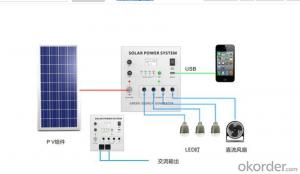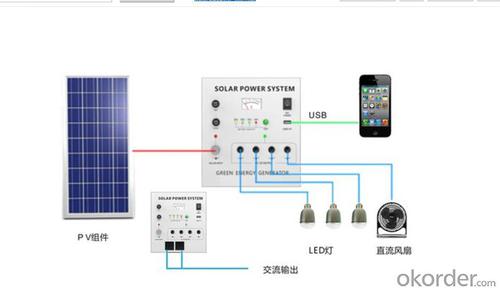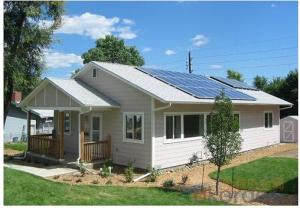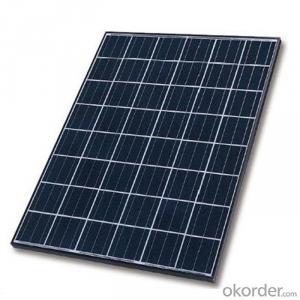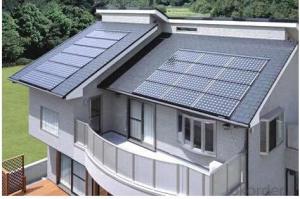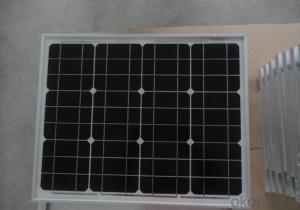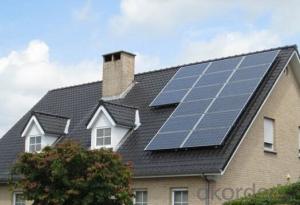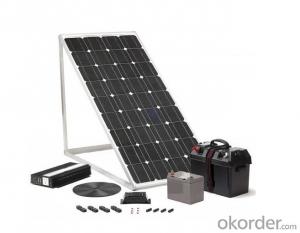Red Sun Solar Energy Systems - Solar System 30W Made in China
- Loading Port:
- China Main Port
- Payment Terms:
- TT OR LC
- Min Order Qty:
- -
- Supply Capability:
- -
OKorder Service Pledge
Quality Product, Order Online Tracking, Timely Delivery
OKorder Financial Service
Credit Rating, Credit Services, Credit Purchasing
You Might Also Like
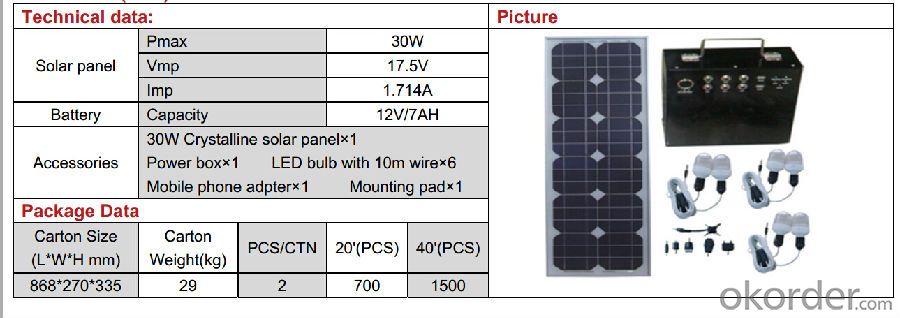
- Q: Can solar energy systems be used in areas with high rainfall?
- Yes, solar energy systems can still be used in areas with high rainfall. While excessive rain and cloud cover can reduce the amount of sunlight reaching the solar panels, modern solar technology is designed to work efficiently even in sub-optimal conditions. Additionally, advancements like tracking systems and bifacial solar panels can help maximize energy production. So, while the overall output of solar energy may be slightly lower in regions with high rainfall, it is still a viable and sustainable option.
- Q: Can a solar energy system be installed on a gas station or convenience store?
- Yes, a solar energy system can be installed on a gas station or convenience store. In fact, many gas stations and convenience stores have already installed solar panels to reduce their energy costs and promote sustainability. Solar energy systems can be mounted on the rooftops of these buildings or installed in nearby open spaces. These systems can generate electricity that can be used to power the store's lighting, refrigeration systems, and other electrical appliances. Additionally, excess electricity generated by the solar panels can be fed back into the grid, allowing the gas station or convenience store to earn credits or revenue through net metering or feed-in tariff programs. Installing a solar energy system on a gas station or convenience store not only helps in reducing energy bills but also showcases the business's commitment to renewable energy and reduces its carbon footprint.
- Q: Can a solar energy system store excess energy for later use?
- Yes, a solar energy system can store excess energy for later use. This is commonly done through the use of batteries, which store the surplus energy generated by the solar panels during periods of low demand or high sunlight, allowing it to be used during times when there is little or no sunlight available.
- Q: How long does it take to recoup the investment in a solar energy system?
- The length of time it takes to recoup the investment in a solar energy system varies and depends on several factors such as the initial cost of the system, the amount of energy it generates, the cost of electricity in the area, and any available incentives or tax credits. On average, it can take anywhere from 5 to 15 years to recoup the investment in a solar energy system. However, with the decreasing cost of solar panels and the potential long-term savings on electricity bills, the payback period is becoming shorter, making solar energy a more attractive and economically viable option for many homeowners and businesses.
- Q: Can solar panels be installed on different types of roofs?
- Yes, solar panels can be installed on different types of roofs including flat, sloped, shingled, metal, and tile roofs. The installation process may vary depending on the roof type, but with proper mounting systems and professional installation, solar panels can be successfully installed on various roof types.
- Q: Is it possible to store excess electricity generated by a solar energy system?
- Excess electricity generated by a solar energy system can indeed be stored. One way to do this is by using batteries, which are commonly employed for this purpose. Battery banks can be integrated into solar energy systems to store surplus electricity produced during the day, allowing it to be utilized at night or during periods of low sunlight. By charging and discharging as necessary, these batteries ensure a consistent and dependable power supply, even in the absence of sunlight. Another means of storing excess electricity is through grid-tied systems. In this configuration, any surplus power generated by the solar energy system is fed back into the electrical grid. The excess electricity is then credited to the homeowner's account, enabling them to draw power from the grid during times when their solar panels are unable to generate enough energy, such as at night or on cloudy days. Both battery storage systems and grid-tied systems offer effective solutions for storing and utilizing surplus electricity generated by solar energy systems. These methods ensure that no energy is wasted and enable homeowners to enjoy a reliable and uninterrupted power supply.
- Q: Can solar energy systems be used in areas with limited access to solar energy conferences and expos?
- Yes, solar energy systems can definitely be used in areas with limited access to solar energy conferences and expos. The availability of conferences and expos may provide valuable information and networking opportunities, but they are not essential for the successful implementation and usage of solar energy systems. With the right resources and expertise, communities and individuals can still benefit from solar energy systems, even without direct exposure to conferences and expos.
- Q: Can solar energy systems be used for space heating?
- Yes, solar energy systems can be used for space heating. Solar thermal systems can capture the sun's energy and convert it into heat, which can then be used to warm indoor spaces. This can be achieved through radiant heating systems, solar air heating systems, or solar water heating systems.
- Q: Can solar energy systems be used for powering electric vehicles charging stations?
- Yes, solar energy systems can be used to power electric vehicle charging stations. Solar panels can generate electricity from sunlight, which can then be stored in batteries or directly used to charge electric vehicles. This renewable energy source is environmentally friendly and can help reduce the carbon footprint associated with transportation.
- Q: Can solar energy systems be installed on industrial facilities?
- Yes, solar energy systems can be installed on industrial facilities. In fact, many industrial facilities are increasingly adopting solar energy systems as a sustainable and cost-effective energy solution. These systems can be installed on rooftops, parking lots, or even on the ground near the facility, providing renewable energy to power various operations within the industrial facility.
Send your message to us
Red Sun Solar Energy Systems - Solar System 30W Made in China
- Loading Port:
- China Main Port
- Payment Terms:
- TT OR LC
- Min Order Qty:
- -
- Supply Capability:
- -
OKorder Service Pledge
Quality Product, Order Online Tracking, Timely Delivery
OKorder Financial Service
Credit Rating, Credit Services, Credit Purchasing
Similar products
Hot products
Hot Searches
Related keywords
